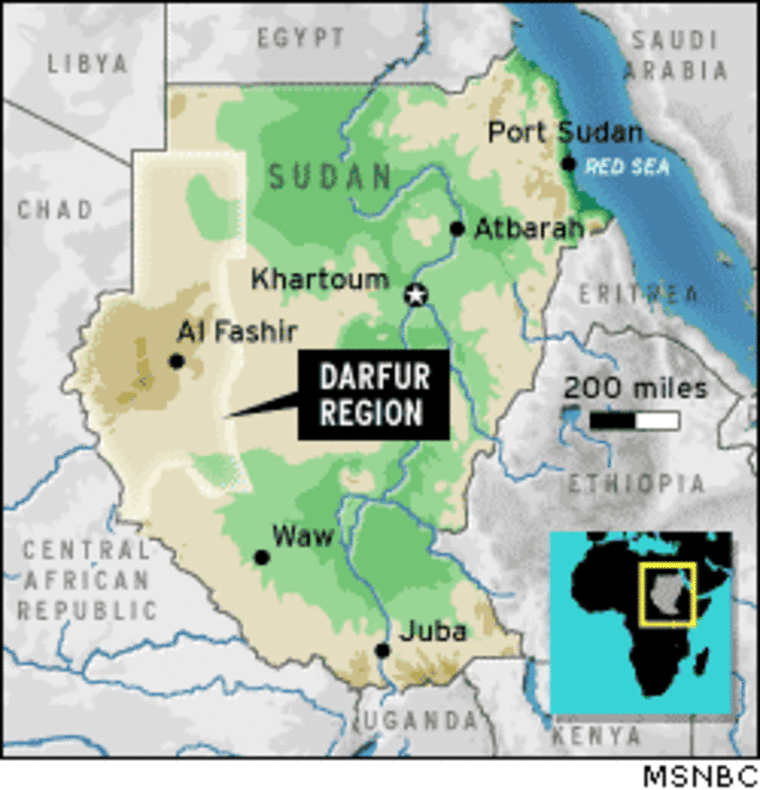The United Nations will increase the number of unarmed staff in Sudan’s Darfur region in hope that their presence will increase security for a population frightened by continuing government and militia attacks, an official said Thursday.
The violence has hampered efforts by the U.N. High Commissioner for Refugees, or UNHCR, to help displaced residents of Darfur, and its staff has been largely restricted to caring for 200,000 Sudanese who have crossed into Chad to avoid attacks.
“The security is a bit iffy,” said Ron Redmond, a spokesman for UNHCR. “Over the last two weeks there have been a series of incidents which have stymied movements by UNHCR. The teams we have on the ground have had to turn back several times because we have had various security incidents.
“It’s a difficult place to work, but it’s hoped that the more international eyes and ears you get on the ground, the more security we’ll see,” he said.
The comments came as the government and two Darfur rebel groups resumed negotiations in Nigeria on the Darfur crisis, with African Union mediators trying to seal an agreement to allow access by humanitarian groups to displaced people. But rebels continue to demand a broader security deal be reached simultaneously, casting doubt on the talks.
Only 50 on the ground
Currently, UNHCR has 50 people in Darfur and emergency teams who come and go, Redmond said, adding that he had no idea how many more staff would be sent in, only that “we’re going to substantially increase that number.”
“We’re not talking armed military protection,” he said. The unarmed UNHCR staff are meant to be the world’s “eyes and ears, people on the ground” who monitor conditions and let the civilians and armed groups know that the international community is watching.

The United Nations estimates that at least 70,000 people have died in and around refugee camps in Darfur since March, but officials say they have no idea how many more have been killed in the fighting aimed at putting down a rebellion that began in February 2003. The conflict, which the United Nations has called the world’s worst humanitarian crisis, has forced 1.7 million villagers from their homes.
The Sudanese government, which calls the estimated death toll an exaggeration, is accused of backing Arab militias known as the Janjaweed, who have carried out a campaign of violence against black non-Arabs, burning down villages and raping and killing residents in an effort to put down the rebellion led by non-Arab groups. Sudan denies backing the Janjaweed.
Stop-and-start talks start back up
Sudanese government and rebel representatives held a brief session of talks Thursday evening in the Nigerian capital, Abuja, but then adjourned until Monday to allow dozens of representatives of Darfur’s two rebel groups — the Sudan Liberation Army and the Justice and Equality Movement — to arrive.
Problems with flights prevented most of the delegates from reaching Abuja in time, said the handful of rebel officials on hand Thursday.
The rebels’ insistence that no humanitarian accord could be signed without a security agreement led to the breakup of the last round of talks in Abuja, which lasted for several weeks in August and September. Fighting has continued in Darfur in recent days, according to the United Nations.
A representative of the smaller of the two rebel groups, the Justice and Equality Movement, stuck by the demand for a security deal.
“We don’t want to sign the humanitarian protocol unless we sign the protocol on security issues,” the official, Ahmed Tugod Lissan, told The Associated Press. “But it seems that the government doesn’t want to discuss the issues.”
Sudan’s ambassador to Nigeria, Abdel Rahim Kalil, said a humanitarian accord was “ready” but that there were “a few issues remaining” before an agreement could be reached on security issues.
On Wednesday, the African Union’s Peace and Security Council agreed to increase its peacekeeping force in Darfur from 390 to 3,320 troops and civilian police in an effort to end the violence.
Said Djinnit, a senior African Union official, said the enhanced force should be in the region by early next month.
Redmond said UNHCR had decided to expand its usual role of caring only for refugees who crossed international borders to meet a request from the Sudanese government. U.N. Secretary-General Kofi Annan has approved the increased responsibility, Redmond said.
He said UNHCR hoped its increased presence would encourage the 1.5 million still in Sudan to stay within the country so they could be closer to home in case it became safe to go back.